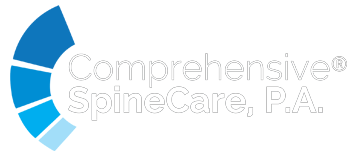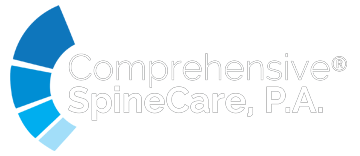Back pain can have a variety of causes which can make it difficult to determine why your back is hurting. Sometimes back pain can even come seemingly out of nowhere, which can make you wonder if you somehow managed to injure yourself. In some cases, this back pain may also be accompanied by tingling or pain that radiates into the appendages. If this is the case, then you are probably wondering if you have a herniated disc.
Herniated discs, also known as slipped discs, are common in adults ages 35-55. They can affect any part of the spine, but usually occur in the lower back. Discs are found in between each of the 24 stacked vertebrae. Their function is to provide cushioning for the vertebrae and to absorb shock from walking, lifting, and twisting. Each disc is individually composed of a soft inner core and a tough outer ring. A disc is said to be herniated when the softer inner core protrudes through the tough outer ring.
Discs can herniate as a result of moving a certain way. It is especially common for people to slip discs while trying to twist or turning to lift an object. Additionally, lifting very heavy objects can strain the lower back and cause a disc to slip. They can also occur when the ligaments that hold the disc in place are weak. As you age, you are more likely to slip a disc due to the fact that they lose their protective water content and can slip out of place easier.
Depending on the location of the slipped disc, as well as its severity, symptoms can vary greatly. Because of this, a herniated disc can only accurately be diagnosed by a spine specialist. With that being said, you may have a herniated disc if…

- You experience pain and numbness predominantly on one side of the body
- Your pain extends into the arms and/or legs
- Your pain gets worse at night
- Your pain gets worse with certain movements, after sitting/standing, or from walking short distances
- You have unexplained muscle weakness
- You experience tingling, aching, or burning sensations in the affected area
If it sounds like you may have a herniated disc, it is important to schedule an appointment with a spine specialist as soon as possible to receive the necessary treatment. Unfortunately, ignoring a herniated disc can cause possible complications such as permanent nerve damage. This is especially the case if your slipped disc is pressing on a nerve and you are experiencing pain in places other than your back.
In rare cases, slipped discs can cut off nerve impulses to the cauda equina nerves causing you to lose bowel and bladder control. Another rare complication is saddle anesthesia in which you lose sensation to your inner thighs, back of the legs, and around the rectum. As mentioned before, these complications can likely be prevented by visiting a spine specialist if you suspect a herniated disc.
Once your spine specialist has made a diagnosis, they will offer you a treatment plan based on their findings. Most treatments for herniated discs are conservative and generally consist of stretching and strengthening the affected area, taking over the counter pain medications, and avoiding motions that can make your symptoms worse. In some cases, surgical intervention may be required to remove a damaged portion of the disc or replace the entire disc.










